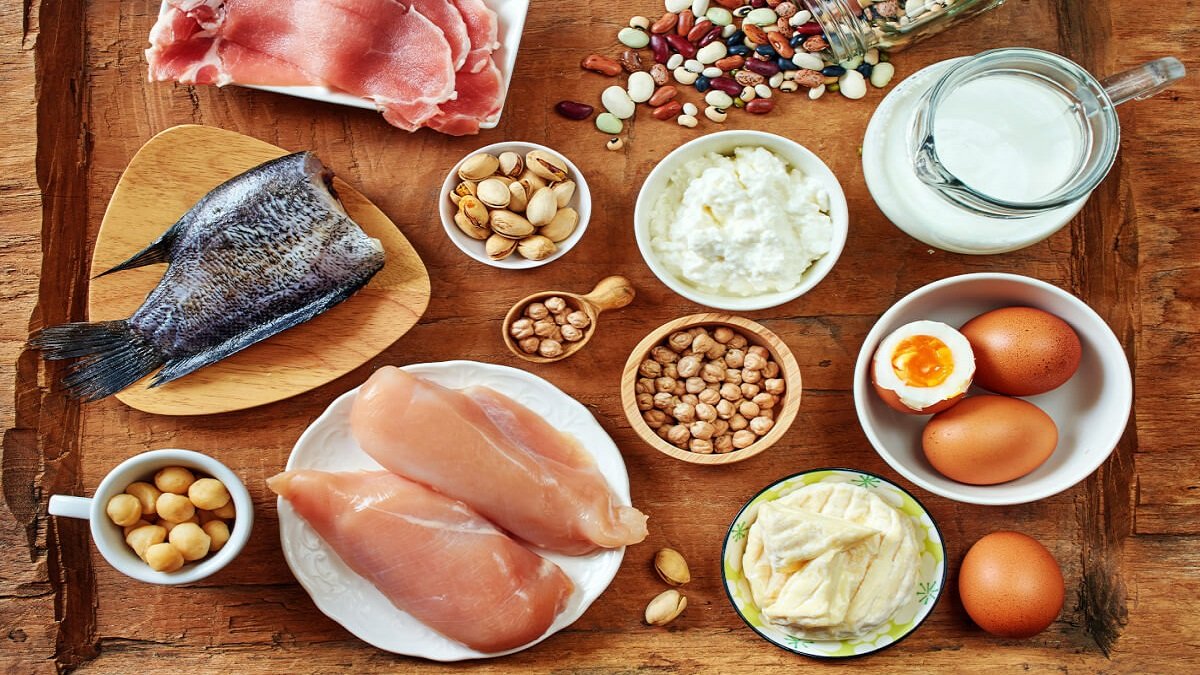Numerous variables, such as age, muscle mass, exercise level, and general health, affect how much protein you need. Along with fats and carbs, protein is one of the three necessary macronutrients. The human body needs these nutrients in rather substantial amounts to operate correctly.
The majority of authoritative nutritional organizations advise a somewhat low intake of protein. But different people have different ideas about how much protein you need. According to the Food Administration, the average adult needs around 50 grams of protein per day.
However, your age, sex, amount of exercise, and health all affect this sum. The ideal protein intake is discussed in this article along with the role that lifestyle choices like exercise levels, weight reduction, and muscle growth play.
Types Of Proteins And Their Role In Your Body

1. Enzymes
Enzymes are essential for digestion, breaking down food into nutrients our body can absorb. While the body naturally produces enzymes, dietary enzymes from raw foods can help enhance digestion. However, how much protein you need is not clearly defined, as the body’s enzyme production is usually sufficient.
The consumption of enzyme-rich foods, such as fruits (like papaya and pineapple), vegetables, and fermented products (like kimchi and sauerkraut), can provide additional support, especially for individuals with digestive issues. It’s important to note that the body produces different enzymes for specific functions, such as amylase for carbohydrates, protease for proteins, and lipase for fats.
While no set daily amount is required, a balanced diet including these enzyme-rich foods can promote better digestive health. For most people, enzyme supplementation is unnecessary unless prescribed by a healthcare provider due to a specific deficiency or digestive disorder.
2. Hormonal Proteins
Hormonal proteins play a crucial role in regulating bodily functions, such as growth, metabolism, and immune response. These proteins are produced by the endocrine glands and act as messengers to control various physiological processes. Unlike nutrients like vitamins or minerals, hormonal proteins are not typically consumed directly from food. Instead, the body synthesizes them using amino acids derived from dietary proteins.
Hormonal proteins are typically produced by specialized glands in the body. Major sources include the pancreas, pituitary gland, thyroid, adrenal glands, and hypothalamus. For example, insulin, a protein hormone, is secreted by the pancreas, while growth hormone comes from the pituitary gland.
Thyroid hormones are produced by the thyroid gland, and adrenal hormones like cortisol are released by the adrenal glands. These proteins regulate various physiological processes, including metabolism, growth, immune function, and stress responses. The synthesis and secretion of hormonal proteins are highly regulated to maintain homeostasis within the body.
Although you don’t need to eat hormonal proteins directly, consuming a balanced diet with sufficient protein ensures your body can produce the necessary hormones to maintain optimal health. Inadequate protein intake may impair hormone production and disrupt bodily functions.
3. Structural Proteins
Structural proteins are crucial for maintaining the integrity of cells, tissues, and organs in the body. They provide support and strength to structures such as muscles, skin, and bones. Collagen, keratin, and elastin are examples of structural proteins that help maintain the structure of the body.
Unlike hormonal proteins, structural proteins are not directly consumed through food. Instead, they are synthesized by the body from the amino acids found in dietary protein. The recommended daily protein intake for adults is about 0.8 grams of protein per kilogram of body weight. This can be met through protein-rich foods such as meat, fish, eggs, beans, and nuts.
Knowing how much protein you should eat supports the body’s ability to produce these essential structural proteins. Insufficient protein intake can lead to muscle weakness, joint problems, and impaired wound healing, as the body lacks the building blocks needed for proper tissue repair and maintenance.
4. Storage Proteins
Storage proteins are essential for storing amino acids, which are the building blocks of proteins, in the body. These proteins, such as casein in milk and albumin in eggs, provide a reservoir of amino acids that can be used for growth, repair, and energy production when needed. However, like structural and hormonal proteins, storage proteins are not directly consumed in large amounts but are synthesized from dietary proteins.
Storage proteins are found in various plant and animal tissues where they store essential nutrients for growth and development. In plants, they are primarily stored in seeds, roots, and tubers. Common sources include legumes, grains, and nuts, which store proteins like globulins and albumins.
In animals, storage proteins can be found in muscles, where they are stored as myoglobin, or in the liver, where ferritin stores iron. These proteins act as reserves of amino acids, iron, or other nutrients, which can be mobilized when needed for metabolic processes, growth, or during periods of scarcity.
While the body doesn’t require storage proteins in the same way it needs essential vitamins or minerals, ensuring a balanced diet with sufficient protein helps maintain overall health, supporting the production and storage of these vital proteins.
5. Transport Proteins
Transport proteins are responsible for carrying molecules, such as oxygen, lipids, and nutrients, throughout the body. Hemoglobin, for example, is a transport protein that carries oxygen in red blood cells, while albumin helps transport fatty acids and other compounds. The body does not require direct consumption of transport proteins through food, as it produces them from amino acids derived from dietary proteins.
To support the production of these essential proteins, it’s important to know how much protein you need to consume daily. The general recommendation is about 0.8 grams of protein per kilogram of body weight for adults, which can be obtained from protein-rich foods like meat, fish, eggs, beans, and nuts.
Although transport proteins are not consumed directly, a balanced diet with sufficient protein intake ensures the body can produce them effectively. Inadequate protein intake may impair the transport of vital substances, potentially disrupting important physiological functions.
6. Defensive Proteins
Defensive proteins, such as antibodies and cytokines, play a critical role in the body’s immune system by protecting against infections and harmful invaders. These proteins are not directly consumed through food but are synthesized by the body from amino acids found in dietary protein. Antibodies, for example, are produced in response to pathogens and are essential for immune defense.
Defensive proteins are primarily produced by the immune system to protect the body from harmful pathogens and foreign invaders. In humans and animals, these proteins include antibodies (immunoglobulins) produced by B cells, which recognize and neutralize pathogens like bacteria and viruses.
Another important group is antimicrobial peptides found in various body fluids, such as saliva, tears, and mucus, which directly attack and destroy microbes. Additionally, certain proteins in the skin, like keratin, act as a physical barrier, while other proteins, like cytokines, coordinate immune responses to infection or injury, helping to defend the body from disease.
7. Contractile Proteins
Contractile proteins, such as actin and myosin, are essential for muscle contraction and movement. These proteins allow muscles to shorten and generate force, playing a vital role in physical activity, heart function, and other bodily movements. While contractile proteins are not consumed directly from food, the amino acids needed to produce them are obtained from dietary protein sources.
To support the production of contractile proteins, it’s crucial to maintain an adequate intake of high-quality protein. The general recommendation for adults is about 0.8 grams of protein per kilogram of body weight per day. This can be achieved by consuming protein-rich foods like meat, fish, dairy, legumes, and nuts.
Contractile proteins are primarily found in muscle tissues and are essential for muscle contraction and movement. The two main contractile proteins are actin and myosin. Actin is found in the thin filaments of muscle fibers, while myosin is located in the thick filaments.
These proteins interact during muscle contraction, allowing muscles to shorten and generate force. The major sources of contractile proteins are skeletal muscle, smooth muscle, and cardiac muscle.
8. Receptor Proteins
Receptor proteins are crucial for cellular communication, as they bind to specific molecules like hormones, neurotransmitters, and growth factors to trigger responses in the body. These proteins are located on cell membranes and enable cells to detect and respond to signals, which are essential for processes such as immune response, metabolism, and tissue growth.
Receptor proteins are not consumed directly through food but are synthesized by the body using amino acids from dietary proteins. To support the production of these proteins, it’s important to maintain an adequate intake of high-quality protein. The general recommendation for protein intake is around 0.8 grams per kilogram of body weight daily for adults.
This can be achieved through protein-rich foods such as meat, fish, eggs, legumes, and dairy products. A balanced diet ensures that the body can produce the necessary amino acids for receptor proteins. Inadequate protein intake may impair cellular communication and disrupt essential bodily functions.
The Role of Proteins In Our Body
Proteins are fundamental molecules in the body, playing diverse and vital roles that are essential for overall health and functioning. Composed of amino acids, proteins are often referred to as the building blocks of life. They are involved in nearly every cellular process and contribute to the structure, function, and regulation of tissues and organs.
One of the most critical functions of proteins is their role in building and repairing tissues. Collagen, a structural protein, forms the basis of connective tissues such as skin, tendons, and ligaments. Similarly, actin and myosin are contractile proteins responsible for muscle movement.
In addition to structural roles, proteins help in the formation of enzymes, which catalyze biochemical reactions, speeding up processes like digestion and energy production. Proteins also serve as transport molecules. Hemoglobin, for example, carries oxygen throughout the body, while albumin transports fatty acids and other molecules in the blood.
Defensive proteins, such as antibodies, play a key role in the immune system by recognizing and neutralizing foreign pathogens. Moreover, proteins regulate bodily functions. Hormones like insulin and growth hormone are proteins that help regulate metabolism and growth. Receptor proteins allow cells to communicate with each other, enabling responses to stimuli such as neurotransmitters and hormones.
Lastly, knowing how much protein you need is crucial for energy production. In cases of prolonged fasting or intense physical activity, the body can break down proteins into amino acids to provide energy.
Given these vital roles, it’s essential to consume enough protein daily to support growth, repair, immune defense, and energy production. Protein-rich foods like meat, fish, eggs, dairy, legumes, and nuts provide the amino acids necessary for these diverse functions.
FAQ
Q: Our daily protein needs are what?
A: For an average sedentary adult, the recommended dietary intake to avoid deficiency is 0.8 grams per kilogram of body weight. Someone weighing 165 pounds, or 75 kg, for instance, should eat 60 grams of protein daily. If your age falls between forty and fifty.
Q: How can one calculate their required protein intake?
A: An average adult requires at least 0.8 grams of protein per kilogram of body weight daily. Second One kilogram equals 2.2 pounds; hence, a person weighing 165 pounds, or 75 kg, would require around 60 grams of protein daily. However, your protein demands may rise if you are active.
Q: Why is protein important?
A: Protein is one of the most critical building elements of your body’s muscles, bones, cartilage, skin, and blood. It is required for practically all of the body’s physiological activities. In addition to being an important macronutrient, it may also act as an energy source when the body can’t metabolize carbs or fat.












You have mentioned very interesting points! ps nice internet site.
Thank you! I’m glad you found the points interesting. Appreciate your kind words about the website!